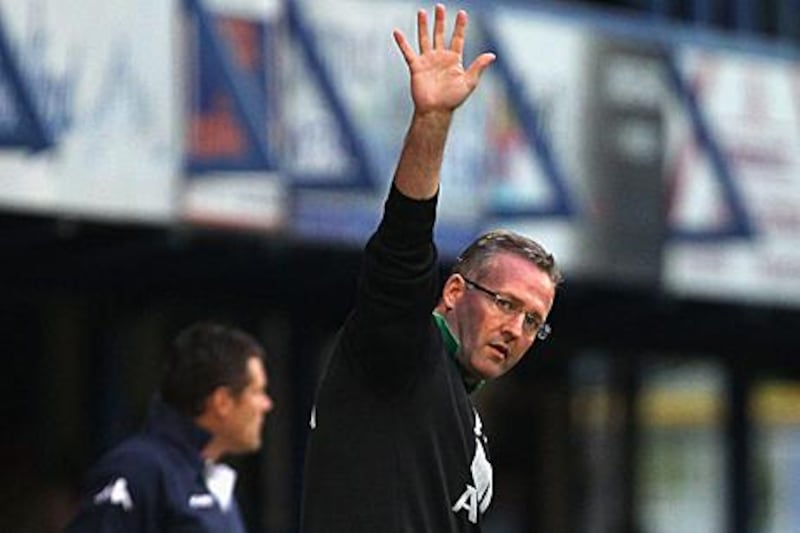If you can't beat them, appoint them. At the lowest ebb in their recent history, Norwich City inverted the usual principle about signing for a stronger side to raid their rivals and begin a barely credible revival.
It was completed at Portsmouth's Fratton Park on Monday night, the side that propped up League One in August 2009 being promoted to the Premier League.
Go back 20 months and Norwich, playing their first match in English football's third tier for 49 years, were beaten 7-1 in an East Anglian derby by Colchester United.
It is the heaviest home defeat of City's 109-year existence, but their response was swift and, ultimately, inspired: they got rid of Bryan Gunn, the manager whose goalkeeping earned him legendary status in Norfolk, and hired the orchestrator of their embarrassment.
In a move that cost £425,000 (Dh2.6 million) in compensation, Paul Lambert was lured from Colchester to become City's fifth manager in three-and-a-half years.
Ninety-nine games, 56 wins and two promotions later, managerial change has become the unspoken fear at Carrow Road: Lambert rejected interest from Scottish giants Celtic, his former club, last year, and Burnley, in January, and is rumoured to be on shortlists at Everton and West Ham United should there be a vacancy at either club.
In truth, the 41-year-old's exploits were always going to attract attention.
He has become the first man since Joe Royle 11 years ago to take a team from League One to the top flight in successive seasons and, while trying to deflect credit for his latest success to his players, has nonetheless described it as "an absolute miracle".
This is, he has argued, an achievement to rank with any in his career. "The magnitude of this is certainly right up there," the Scot said.
That is no mean feat; this is a European Cup winner speaking. Indeed, Lambert was the first Briton to conquer the continent with a foreign club.
His first season at Borussia Dortmund culminated in a Champions League final win over Juventus in 1997. Lambert, who crossed for Karl-Heinz Riedle's opening goal, was the unheralded member of a midfield that included Paulo Sousa and Andreas Moller.
"As a player I played with some world-class players - I was the only bad one there," he said, with false modesty.
More accurately, there was little spectacular about Lambert the footballer. Instead, he understood the game, his reading of a match as integral in the midfield holding role as it has since proved in the dugout.
A surprise recruit for Borussia, he had nonetheless helped break the Old Firm duopoly of Celtic and Rangers in Scotland when Alex McLeish's Motherwell finished second.
Returning to his homeland, though he later went back to Germany to study for his coaching badges, the man capped 40 times captained Celtic during eight years at Parkhead.
It was there that Lambert met his role model: Martin O'Neill.
"Paul is so like Martin in a lot of ways," said John Hartson, a former teammate. "He now even has the glasses. He has definitely been studying Martin. Paul is more like O'Neill than Martin is like his old mentor, Brian Clough."
Speaking in 2006, O'Neill said: "When I had him and [the striker] Henrik Larsson at Celtic, the pair were fantastic - they were always the first to arrive and the last to go, and gave everything for the club.
"When I arrived at Celtic, he was already captain, and it was soon evident what a great leader he was on the pitch and in the dressing room."
O'Neill's influence has been apparent on his protege's career.
After Lambert had a false start at Livingston, where he only won two games in six months, O'Neill recommended the Glaswegian to his former employers, Wycombe Wanderers.
He reached the Carling Cup semi-finals with the League Two club and impressed at Colchester, without quite suggesting the level of success he has had at Norwich.
But Lambert's time in the lower leagues was well spent. He built up a mental database of young, hungry players and set about recruiting them.
Simeon Jackson, who scored the goal to clinch promotion, was signed from Gillingham Town; Paul Tierney, the left-back, and David Fox, a midfielder, came from Colchester United; Andrew Crofts, plucked from Brighton and Hove Albion, and Zak Whitbread, recruited from Millwall, were all League One footballers.
Aided by Lambert's policy of deploying a midfield diamond, they have formed a team.
"We have a great bunch of lads," said Grant Holt, the captain and top scorer, who was in League Two two seasons ago. "We've a great spirit and desire."
That is proved by a startling statistic: Norwich have scored 12 injury-time goals this season, earning 11 points in the process.
Much as the players have surpassed themselves, the captain has no doubt where the credit belongs. "The manager has been fantastic," Holt said. "He's a motivator and has been great for us."






